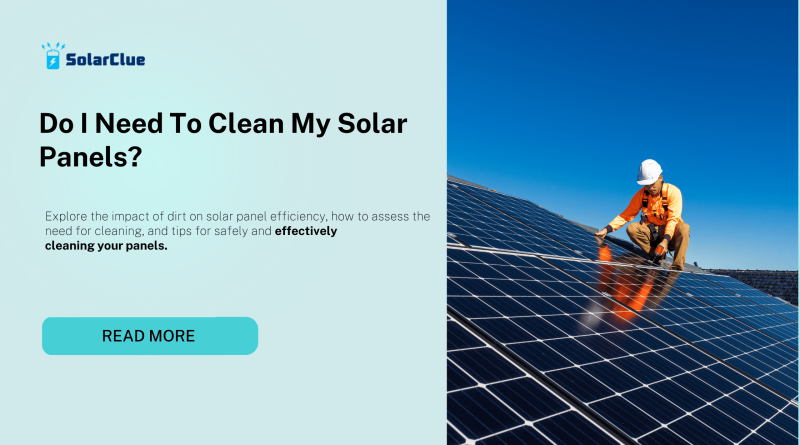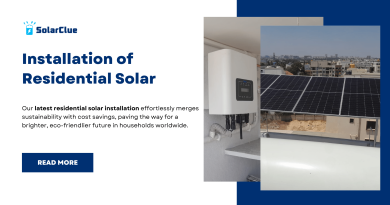Do I Need To Clean My Solar Panels?
Solar panels are a significant investment that can provide clean energy for decades. However, their efficiency can be compromised by dirt, debris, and bird droppings that accumulate over time. Regular cleaning is essential to maintaining optimal performance and maximizing the lifespan of your solar panels. This blog covers the impact of dirt on solar panel efficiency, how to assess the need for cleaning, and tips for safely and effectively cleaning your panels.
Table of Contents
- 1 The Impact of Dirt and Debris on Solar Panel Performance
- 1.1 Signs That Your Solar Panels Need Cleaning
- 1.2 Cleaning Methods and Techniques
- 1.3 Safety Precautions for Solar Panel Cleaning
- 1.4 Cleaning Frequency and Factors to Consider
- 1.5 Professional Solar Panel Cleaning Services
- 1.6 DIY vs. Professional Cleaning: Weighing the Pros and Cons
- 1.7 The Role of Solar Panel Warranties in Covering Cleaning Costs
- 1.8 The Impact of Cleaning on Solar Panel Lifespan
- 1.9 Preventing Future Dirt Buildup on Solar Panels
- 1.10 Conclusion
- 1.11 FAQ
The Impact of Dirt and Debris on Solar Panel Performance
Efficiency Reduction:
- Shading and Obstruction: Dirt, dust, leaves, bird droppings, and other debris can block sunlight from reaching the solar cells, leading to a significant reduction in energy production.
- Studies and Data: Research indicates that dirty panels can experience a performance drop of up to 20%, depending on the level of soiling and the location.
Hotspots:
- Localized Heating: Accumulated debris can cause hotspots on the panel’s surface, where the solar cells heat up unevenly. This can lead to long-term damage and further reduce the panel’s efficiency.
Signs That Your Solar Panels Need Cleaning
Visible Dirt and Debris:
- Visual Inspection: If you can see a noticeable layer of dirt, dust, or debris on the panels from the ground, it’s a clear sign that cleaning is needed.
Decreased Energy Output:
- Monitoring Performance: A sudden or gradual decrease in energy output, as indicated by your monitoring system, may suggest that the panels are dirty and not performing at their best.
Bird Droppings:
- Spot Cleaning: Bird droppings can be particularly problematic as they can cause significant shading and are more stubborn to remove than dust or dirt.
Cleaning Methods and Techniques
Basic Cleaning:
- Water and Soft Brush: Use a soft brush or sponge with water to gently clean the surface of the panels. Avoid abrasive materials that could scratch the glass.
- Hose Rinse: For light cleaning, a simple rinse with a garden hose can remove loose dirt and debris.
Advanced Cleaning:
- Soap Solutions: If water alone doesn’t suffice, a mild soap solution can be used. Ensure it is eco-friendly and rinsed off thoroughly to prevent residue.
- Avoiding Pressure Washers: High-pressure water can damage the panels and should be avoided.
Automated Cleaning Systems:
- Robotic Cleaners: Some systems use robotic cleaners that can be programmed to clean the panels at regular intervals, particularly useful for large installations.
Safety Precautions for Solar Panel Cleaning
Personal Safety:
- Use of Safety Gear: When cleaning rooftop panels, wear a safety harness and use non-slip footwear to prevent falls.
- Avoid Electrical Hazards: Always turn off the solar system before cleaning to avoid the risk of electric shock.
Panel Safety:
- Avoid Scratching: Use only soft brushes and sponges to clean the panels, as scratches can reduce efficiency.
- Cool Cleaning: Clean the panels in the early morning or late evening when they are cool to prevent thermal shock and to avoid burns from hot surfaces.
Cleaning Frequency and Factors to Consider
Geographical Location:
- Desert and Dusty Areas: Panels in arid regions with frequent dust storms may require more frequent cleaning—every few months.
- Urban and Industrial Areas: Panels in areas with higher pollution levels may need cleaning every 3-6 months.
Weather Conditions:
- Rainfall: In regions with regular rainfall, the panels may be naturally cleaned and require less frequent maintenance.
- Pollen and Leaves: In areas with high pollen levels or falling leaves, more frequent cleaning may be necessary during certain seasons.
Professional Solar Panel Cleaning Services
Benefits:
- Expertise and Equipment: Professionals have the tools and experience to clean panels safely and effectively, especially in hard-to-reach locations.
- Comprehensive Cleaning: They can provide a thorough cleaning that DIY methods might not achieve, including removing stubborn stains like bird droppings.
Costs:
- Service Fees: While more expensive than DIY, professional cleaning services can be worth the investment to maintain the efficiency and lifespan of your solar panels.
DIY vs. Professional Cleaning: Weighing the Pros and Cons
| Aspect | DIY Cleaning | Professional Cleaning |
|---|---|---|
| Cost | Low, mainly the cost of water and basic tools | Higher, involves paying for professional services |
| Effort and Time | Time-consuming, especially for large installations | Quick and efficient, professionals handle everything |
| Safety | Requires personal safety precautions | Professionals are trained and equipped for safe cleaning |
| Effectiveness | May not remove stubborn debris effectively | More thorough, with access to specialized equipment |
| Access to Panels | Challenging for hard-to-reach areas | Professionals can safely access difficult locations |
The Role of Solar Panel Warranties in Covering Cleaning Costs
Warranty Coverage:
- Performance Warranties: Some solar panel warranties may include performance guarantees that could be voided if panels are not regularly cleaned.
- Cleaning Services: Few warranties cover the cost of cleaning, but neglecting maintenance can lead to warranty issues.
Manufacturer Recommendations:
- Follow Guidelines: Always follow the manufacturer’s recommendations for cleaning to ensure that your warranty remains valid.
The Impact of Cleaning on Solar Panel Lifespan
Prevention of Long-Term Damage:
- Avoiding Degradation: Regular cleaning helps prevent the buildup of dirt and debris that can lead to hotspots and other damage, thereby extending the lifespan of the panels.
Maintaining Efficiency:
- Sustained Performance: Clean panels maintain their efficiency over time, ensuring you get the most out of your solar investment.
Preventing Future Dirt Buildup on Solar Panels
Anti-Reflective Coatings:
- Dirt-Resistant Surfaces: Some panels come with anti-reflective and dirt-resistant coatings that minimize the accumulation of dust and debris.
Tilt and Angle Adjustments:
- Optimized Placement: Installing panels at an angle can help water runoff naturally, reducing the amount of dirt that sticks.
Bird Deterrents:
- Preventing Droppings: Installing bird spikes or netting can deter birds from perching on your panels and causing debris buildup.
Conclusion
Regular cleaning is essential to maintaining the efficiency and longevity of your solar panels. By understanding the impact of dirt and debris on performance, recognizing when to clean, and choosing the right methods and precautions, you can ensure that your solar system operates at its best. Whether you opt for DIY cleaning or professional services, keeping your panels clean is a vital part of protecting your investment and maximizing your energy savings.
Here at SolarClue®, we offer a smart, practical, and “beautiful” solution. You will be answered for all the questions related to Solar.
We provide all kinds of brands that are the Best Solar panels in India.
If you are the one who is planning for the solar power system. Don’t hesitate to contact our team!
Looking forward to empowering you with solar energy, just like hundreds of our other clients!
FAQ
1. How often should I clean my solar panels?
Cleaning frequency depends on your location and environmental conditions, but generally, panels should be cleaned every 6-12 months. In dusty or polluted areas, more frequent cleaning may be necessary.
2. Can I use a pressure washer to clean my solar panels?
No, using a pressure washer can damage the panels. It’s best to use a soft brush or sponge with water, or hire a professional cleaning service.
3. How can I tell if my solar panels need cleaning?
Signs include visible dirt or debris on the panels, a noticeable drop in energy production, and the presence of bird droppings.
4. Is it safe to clean solar panels on my own?
Yes, but safety precautions are crucial. Use a safety harness if on a roof, turn off the system before cleaning, and avoid working in hot weather.
5. Does cleaning my solar panels void the warranty?
Cleaning your panels typically doesn’t void the warranty, but neglecting maintenance could lead to issues that aren’t covered. Always follow the manufacturer’s cleaning recommendations.


